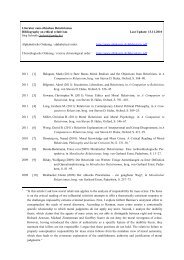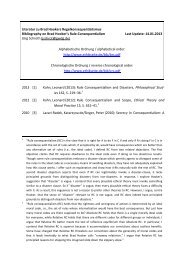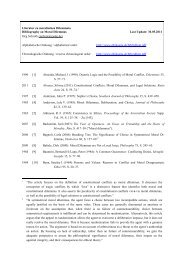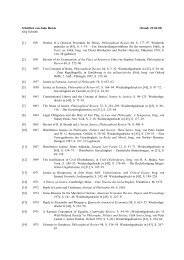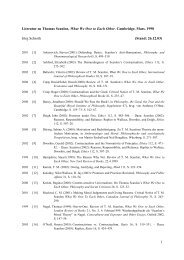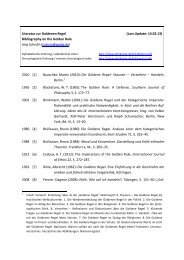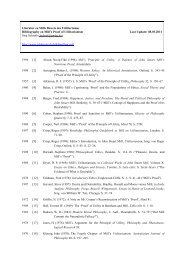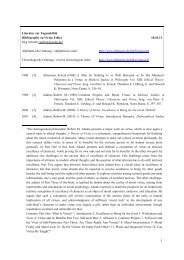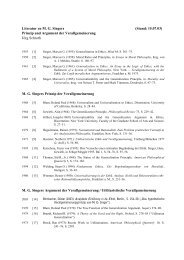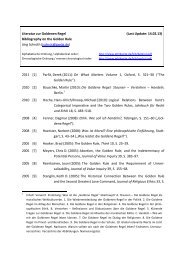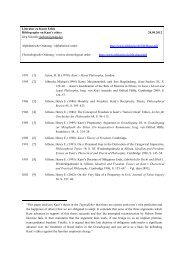Chronologische - Ethikseite
Chronologische - Ethikseite
Chronologische - Ethikseite
Create successful ePaper yourself
Turn your PDF publications into a flip-book with our unique Google optimized e-Paper software.
2009 [134] Guyer, Paul (2009): Ist und Soll. Von Hume bis Kant, und heute, in Kant und die Zukunft der<br />
europäischen Aufklärung, hrsg. von Heiner Klemme, Berlin, S. 210–31.<br />
2009 [135] Guyer, Paul (2009): Problems with Freedom: Kant’s Argument in Groundwork III and its<br />
Subsequent Emendations, in Kant’s Groundwork of the Metaphysics of Morals. A<br />
Critical Guide, hrsg. von Jens Timmermann, Cambridge, S. 176–202.<br />
2009 [136] Hill, Jr., Thomas E. (Hrsg.) (2009): The Blackwell Guide to Kant’s Ethics, Malden, MA.<br />
2009 [137] Hills, Alison (2009): Happiness in the Groundwork, in Kant’s Groundwork of the Metaphysics<br />
of Morals. A Critical Guide, hrsg. von Jens Timmermann, Cambridge, S. 29–44.<br />
2009 [138] Holtman, Sarah (2009): Autonomy and the Kingdom of Ends, in The Blackwell Guide to<br />
Kant’s Ethics, hrsg. von Thomas E. Hill, Jr., Malden, MA, S. 102–17.<br />
2009 [139] Irwin, Terence (2009): The Development of Ethics. Volume III: From Kant to Rawls, Oxford,<br />
S. 1–172 (66. Kant: Practical Laws. 67. Kant: From Practical Laws to Morality. 68.<br />
Kant: Some Objections and Replies. 69. Kant: Freedom. 70. Kant: From Freedom to<br />
Morality. 71. Kant: Morality and the Good. 72. Kant: Meta-Ethical Questions.).<br />
2009 [140] Johnson, Robert N. (2009): Good Will and the Moral Worth of Acting from Duty, in The<br />
Blackwell Guide to Kant’s Ethics, hrsg. von Thomas E. Hill, Jr., Malden, MA, S. 19–<br />
51.<br />
2009 [141] Johnson, Robert N. (2009): The Moral Law as Causal Law, in Kant’s Groundwork of the<br />
Metaphysics of Morals. A Critical Guide, hrsg. von Jens Timmermann, Cambridge, S.<br />
82–101.<br />
2009 [142] Kain, Patrick (2009): Kant’s Defense of Human Moral Status, Journal of the History of<br />
Philosophy 47, S. 59–101. 43<br />
2009 [143] Kerstein, Samuel J. (2009): Deriving the Supreme Moral Principle from Common Moral Ideas,<br />
in The Blackwell Guide to Kant’s Ethics, hrsg. von Thomas E. Hill, Jr., Malden, MA,<br />
S. 121–37.<br />
2009 [144] Kerstein, Samuel (2009): Treating Others Merely as Means, Utilitas 21, S. 163–80. 44<br />
And the failure of the argument is the failure of Kant’s nascent effo rts to provide a new, phenomenological<br />
method for the grounding of practical philosophy.”<br />
43 “The determination of individual moral status is a central factor in the ethical evaluation of controversial<br />
practices such as elective abortion, human embryo-destructive research, and the care of the severely disabled<br />
and those in persistent vegetative states. A review of recent work on Kant reveals the need for a careful<br />
examination of the content of Kant’s biological and psychological theories and their relation to his views<br />
about moral status. Such an examination, in conjunction with Kant’s practical-metaphysical analysis of the<br />
origins of freedom, reveals Kant’s principled basis for his contention that all human beings possess moral<br />
status.”<br />
44 “In the Formula of Humanity, Kant embraces the principle that it is wrong for us to treat others merely as<br />
means. For contemporary Kantian ethicists, this Mere Means Principle plays the role of a moral constraint:<br />
it limits what we may do, even in the service of promoting the overall good. But substantive interpretations<br />
of the principle generate implausible results in relatively ordinary cases. On one interpretation, for example,<br />
you treat your opponent in a tennis tournament merely as a means and thus wrongly when you try, through<br />
defeating him, to win first place. The article aims to develop a reconstruction of the Mere Means Principle



